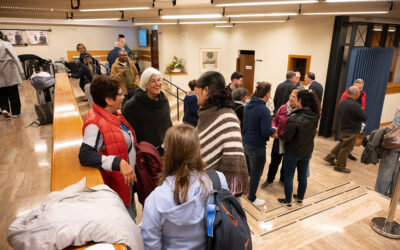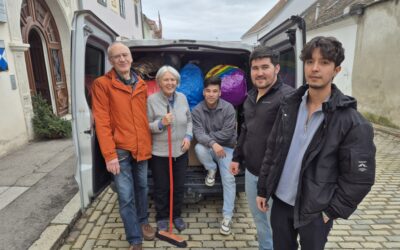In international jargon they are called “expats”: they are the young expatriates who have found work and have decided to live abroad. Each one has his or her own reasons for making this move, each one has their own story. Mitty is an expat: she is Italian and does research on glucose biosensors at a Japanese university and lives in the Focolare community in Tokyo. “Today, technology has enormous influence in all fields, including health care. I feel called to work in this area because I want to help direct technical research according to ethical and non-business choices. Sometimes we biomedical engineers invent things that reduce human beings to robots but do nothing to improve health. There is no doubt that Mitty whose real name is Maria Antonietta Casulli has clear ideas. She studied biomedical engineering in Italy, but moved to Switzerland to complete her thesis at the prestigious Ecole polytechnique fédérale de Lausanne (EPFL – Federal Polytechnic School of Lausanne) and was awarded a research post to prepare for a doctorate. The prerequisites for a marvellous career were all there: a substantial salary, a beautiful house with a view of Lake Geneva, good friends. What more could she have wanted? “And yet – says Mitty – something was not working: it was 2013; we were in the midst of an economic crisis and I had a perfect life. But beyond the Alps, in Italy, many of my friends were running the risk of becoming depressed because they couldn’t find work. In addition, I didn’t want my life to consist only of a career and money. But the “coup d’état” was a trip to the Philippines where I found myself in the middle of one of the most powerful and devastating typhoons in the world: Typhoon Yolanda. The contrast I experienced was enormous: this people had nothing of what my friends and I had, but they lived life with a capital “L”; their life was full, rich in relationships and great dignity. Paradoxically, this seemed to me to be the medicine for the crisis that my continent, Europe, was going through: it was not just an economic crisis; it was much more: a void in the fundamental values of life”. After that trip Mitty decided not to return to Switzerland because she felt she wanted give back to God all the life that he had given to her. And so, following a period of formation for focolarini, she moved to Japan two years ago and now lives in the Focolare community in Tokyo. Upon arriving, her first task was to study the language. This challenge plus the time taken for formation has meant she has been out of the world of work for five years. Could she go back to doing research, especially in a society like Japan? “Just as I was asking myself these questions, a friend who was passing by told me about a Japanese Catholic professor from a university in Tokyo who does research on glucose biosensors – the very subject I had studied for my degree!  Since the chances of finding someone in Japan who had completed the same studies are almost nil, Mitty understood that God was at work in her life and she has since seen he continues to do so. The professor gave her the opportunity to complete her doctorate, but there was still a problem: “In Japan I wouldn’t have had a salary as I would have done in Switzerland. In fact, I would have had to pay for my doctorate”. Here too, God’s answer was surprising. Almost by chance, Mitty found herself being interviewed by six managers from different Japanese companies: a difficult situation for a young foreign woman. “I felt that God was with me and that, in the end, they were all just people to love. This changed the way I presented the project and listened to them when they spoke. For an hour I told them about my project, but for the next hour I answered their questions about my choice of life as a focolarina and why I was in Japan. I received 100% of the funding for the project and I must say that I saw the power of God making its way into this culture and these environments in a world I had never imagined. Just two months after beginning my doctorate, my former Swiss professor came to Tokyo and we were able to organize a seminar at my new university. At dinner, watching the two professors speak together, it seemed to me that I understood what God wants from me now. Not only to do research, but to build bridges: between universities and companies, between East and West. All I have to do is continue to give myself totally to God”.
Since the chances of finding someone in Japan who had completed the same studies are almost nil, Mitty understood that God was at work in her life and she has since seen he continues to do so. The professor gave her the opportunity to complete her doctorate, but there was still a problem: “In Japan I wouldn’t have had a salary as I would have done in Switzerland. In fact, I would have had to pay for my doctorate”. Here too, God’s answer was surprising. Almost by chance, Mitty found herself being interviewed by six managers from different Japanese companies: a difficult situation for a young foreign woman. “I felt that God was with me and that, in the end, they were all just people to love. This changed the way I presented the project and listened to them when they spoke. For an hour I told them about my project, but for the next hour I answered their questions about my choice of life as a focolarina and why I was in Japan. I received 100% of the funding for the project and I must say that I saw the power of God making its way into this culture and these environments in a world I had never imagined. Just two months after beginning my doctorate, my former Swiss professor came to Tokyo and we were able to organize a seminar at my new university. At dinner, watching the two professors speak together, it seemed to me that I understood what God wants from me now. Not only to do research, but to build bridges: between universities and companies, between East and West. All I have to do is continue to give myself totally to God”.
Stefania Tanesini




0 Comments